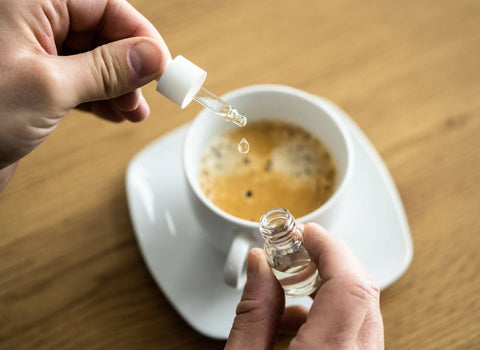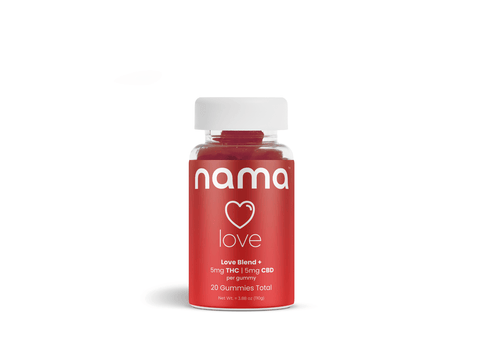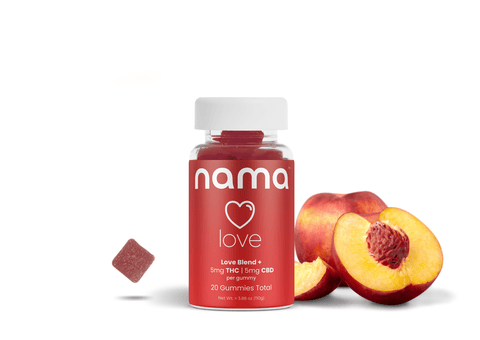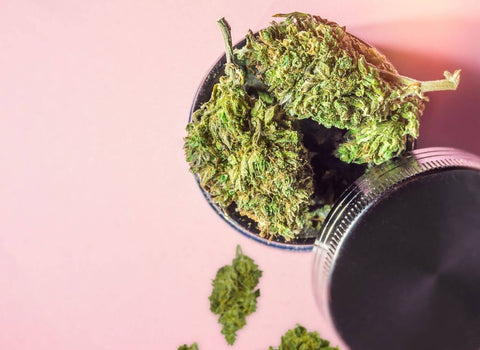Delta 9 THC is a well-known appetite stimulant (ever hear of the “munchies”?). It turns out that microdosing Delta 9 can increase appetite naturally and safely—without the psychoactivity commonly associated with cannabis consumption.

Let’s uncover the intricate relationship between Delta 9 and appetite stimulation. Stay with us to learn more about this natural appetite enhancer.
What Is Delta 9 THC?
Delta 9 THC, or Delta-9-tetrahydrocannabinol, is the main psychoactive compound found in the cannabis plant. It's responsible for the 'high' feeling that users experience when consuming marijuana. Delta 9 THC interacts with the endocannabinoid system in the body, specifically binding to CB1 receptors found primarily in the brain.
Delta 9 Benefits
Delta 9 THC brings an array of benefits that contribute to its growing popularity in both recreational and medicinal use. From its psychoactive effects that elevate mood to its remarkable ability to provide chronic pain relief, the benefits of THC are numerous.
However, too much Delta 9 has some downsides. At the doses common to recreational cannabis use, Delta 9 consumption is associated with some negative outcomes that cloud its benefits. That’s why we recommend microdosing Delta 9. Low doses of Delta 9 have all the benefits without any of the drawbacks of higher doses.
Interested in microdosing Delta 9? Our collection of Delta 9 edibles provides the best way to get low doses in a tasty and reliable manner that is also federally legal in the US!
For example, our Energy gummies with Delta 9 are filled with high-quality, vegan ingredients and contain just the right amount of THC to get its many benefits.
Here are some noteworthy benefits of Delta 9 microdosing:
- Low doses of Delta 9 THC are beneficial for those struggling with mental health disorders. Microdosing THC for depression and anxiety was shown to be particularly beneficial.
- Microdosing THC is incredibly effective for providing relief from chronic pain, making it a natural alternative to conventional painkillers.
- Small doses of Delta 9 have been widely recognized in the medical community for their antiemetic properties, especially for chemotherapy patients.
- For people dealing with conditions like HIV/AIDS or cancer where loss of appetite is common, THC can help by stimulating hunger.
Delta 9 Side Effects
While Delta 9 THC offers therapeutic benefits, it's crucial to know its potential risks if you plan on taking it. Delta 9 does not have long term side effects but can cause temporary adverse effects when taken in high doses. Some adverse effects associated with high doses of Delta 9 may include:
- dry mouth
- increase in heart rate
- alterations in blood pressure
- nausea and vomiting
- paranoia and anxiety
Each person's response to Delta-9 THC will vary, but low doses of this cannabinoid are unlikely to cause any side effects. So, stick with microdosing THC and get its benefits without the risk of adverse reactions.
For example, our THC drinks are an easy, discreet, and tasty way to get the benefits of microdosing THC.


THC: 10 mg | CBC: 10 mg | CBD: 10 mg | CBG: 5 mg | CBN 5mg
Delta 9 and Appetite
Delta 9 is a known appetite stimulant, which could be beneficial for people struggling with appetite because of a medical condition or a treatment.
The interaction of Delta 9 THC with our body's endocannabinoid system drives “the munchies.” The ECS is involved in a number of physiological functions, including increasing your appetite and improving digestion. CB1 cannabinoid receptors—for which Delta 9 THC has a high affinity—play important physiological roles in digestion and food intake.
By binding to and activating CB1 receptors, THC increases the production of the hormone ghrelin, which signals the brain that it's time to eat.
One clinical trial published by the National Library of Medicine demonstrated “significant alterations of the appetite hormones ghrelin, [peptide YY] and leptin in blood” from Delta 9 consumption. THC also interacts with the hypothalamus, an area of our brain that controls hunger and satiety, causing an increase in appetite.
Taking microdoses of THC is a quick and easy way to increase appetite, even if you don’t want the psychoactive properties of this compound.
Our Euphoria Delta 9 gummies offer users a quick and pleasant way to boost their appetites without the hazards associated with smoking or other types of consumption. This product contains precisely calculated amounts of THC that allow you to reap the benefits of this compound without stimulating your appetite.
Does Delta 9 Make You Hungry?
Delta 9 is known for stimulating appetite, so you will likely feel hungry, especially if you take high doses of THC. The THC benefit of appetite improvement is often used to treat appetite issues caused by eating disorders, medications that suppress appetite, and AIDS-related anorexia.
According to the cannabis research conducted by the University of California San Diego, “THC has been established as a therapeutic for anorexia associated with Acquired Immunodeficiency Syndrome (AIDS) and is used to stimulate appetite associated with other disorders.”
THC may also make you hungry by improving the sensory sensations of eating, making food appear more appealing. A double-blind, placebo-controlled trial examined whether THC can improve taste and smell perception as well as appetite, caloric intake, and quality of life (QOL) for cancer patients.
Patients treated with THC reported improved and enhanced chemosensory perception and said that the food ‘tasted better’.
These appetite stimulating effects of Delta 9 might be beneficial for increasing appetite in people who have lost it due to medical illnesses or treatments (such as cancer patients during chemotherapy).
Does Delta 9 Cause Weight Gain?
Delta 9 THC can stimulate appetite and promote weight gain in people with illness-related weight losses. The appetite-stimulating effects of THC could potentially lead to weight gain if the increased appetite results in higher calorie consumption.
However, the effects of Delta 9 THC can vary greatly among people and the link between its use and weight gain is not straightforward. Some research, such as this 2022 study, even suggests that cannabis users might have a lower risk of obesity, despite the increased appetite.
As always, maintaining a balanced diet and regular exercise is important for weight management, regardless of Delta 9 THC use. But, if you want to prevent the “munchies,” taking low doses of THC can help you get its benefits without overeating. Try our Bliss gummies with Delta 9 for the perfect dose of THC to get its benefits without the dreaded “munchies.”
Delta 8 vs Delta 9 Effects
Delta 8 is chemically quite similar to Delta-9 THC. The only difference between the two is the placement of carbon double bonds, which are located on the ninth carbon atom for Delta 9 THC and the eighth carbon atom for Delta 8 THC.
When it comes to their effects, Delta 8 is about as half as strong as Delta 9 THC. In a recent study, participants who had tried both referred to Delta 8 THC as Delta 9’s nicer younger sibling.
If you’re wondering how much Delta 8 you should take, read our article on how much Delta 8 is equivalent to Delta 9 for more information.
Delta 8 vs Delta 9 High
While both Delta 8 and Delta 9 THC can produce psychoactive effects, the experience they provide can differ significantly.
Delta 9 THC typically results in a more potent and intense high, while Delta 8 THC tends to offer a more relaxed and clear-headed high. As with all cannabinoids, the effects can vary greatly among people based on factors such as tolerance, dosage, and the method of consumption.
If you’re looking for gummies to relax and elevate you without getting you too high, try our Elevate gummies with Delta 8 THC.
Is Delta 8 Making Me Gain Weight?
Delta 8 THC itself is not directly associated with weight gain. However, it's known to stimulate the appetite, which could lead to increased food intake and subsequent weight gain. For those struggling with a lack of appetite or trying to maintain body weight, this feature of Delta 8 could be beneficial.
If you're aiming to lose weight or maintain a certain weight level, it's important to balance THC consumption with a healthy diet and exercise regime, especially if you frequently get the “munchies.” Or, take low doses of Delta 8 to get its benefits without the munchies.
Product QUIZ
Need help deciding what product is best for you? Take our quiz, just three questions until your perfect match!
Are You Interested in Taking Delta 9 Gummies to Stimulate Appetite?
Are you in search of a natural, effective way to stimulate your appetite? Look no further than our Delta 9 gummies! For example, our Relax Plus gummies with Delta 9 are a terrific way to unwind and stimulate your appetite without the risk of taking too much THC.
Expertly crafted from premium hemp, these gummies are a delicious and convenient way to benefit from the appetite-boosting effects of THC. Each gummy offers a low dose of THC, widely recognized as the ideal way to stimulate appetite without overwhelming effects.
As a commitment to our customers' wellness and values, our Delta 9 products are 100% vegan and composed of top-tier ingredients.
Start transforming your meal times into more enjoyable and satisfying experiences. With just a couple of our delicious gummies, you're not just enhancing your appetite, you're embarking on a healthier lifestyle journey! Give them a try and experience the difference today.
FAQ on Delta 9 and Appetite
Delta-9 tetrahydrocannabinol (THC) is naturally occurring, but synthetic forms of Delta-9 THC do exist and are often used in medical and research settings. THC and CBD oils, along with other cannabis products, may contain either natural or synthetic forms of the compound. Our products contain only natural Delta 9 derived from hemp.
Recreational and medicinal cannabis are legal in some US States, but not federally. Hemp-derived commercial Delta 9 edibles are legal on a federal level. All our Delta 9 gummies are federally legal, as they contain no more than 0.3% of hemp-derived THC per dry weight.
Yes, Delta-9 THC is known to stimulate appetite, a phenomenon commonly referred to as "the munchies." This effect is attributed to Delta-9's interaction with the endocannabinoid system, which plays a crucial role in regulating a variety of physiological processes, including appetite and hunger.
The way Delta 9 makes you feel depends on how much you take. People consuming low to moderate doses of THC report feelings of relaxation and reduced anxiety, elevated mood and focus, and pain relief, while extremely high doses can cause temporary side effects such as drowsiness, anxiety, and paranoia.
Delta-9 THC, like any substance, can potentially have both beneficial and harmful effects, and its impact on health largely depends on the frequency and amount of usage, the person’s health condition, and their age.
As a key component of medical cannabis, Delta-9 THC has been utilized to manage and treat a variety of medical conditions including chronic pain, nausea, and some psychiatric disorders, thereby contributing to healthier living and healthy aging for people with these conditions.
However, excessive or improper use may lead to negative effects such as impaired memory, altered mental states, and potential dependence.
As with any substance, especially one that has psychoactive effects, it's important to use Delta-9 THC responsibly and under the supervision of a healthcare professional, particularly when used for medical purposes. Taking microdoses of THC ensures that you get its benefits without the unwanted side effects.
No, Delta 9 is not bad for anxiety when taken in appropriate doses. While high doses of Delta 9 can cause anxiety, low doses of THC appear to alleviate it. Read more about the anxiety-relieving properties of THC in our blog post on microdosing edibles for anxiety.
Excessive consumption of Delta-9 THC can lead to unpleasant experiences and side effects. The most common symptoms include heightened anxiety, paranoia, confusion, hallucinations, and an increased heart rate. Overconsumption can also cause dizziness, nausea, and in rare cases, vomiting.
The best way to prevent these side effects is to take low doses of Delta 9 THC. Our edibles contain microdoses of THC, so you don’t run the risk of having too much of it as long as you follow the dosage instructions provided on the pack.
No, we do not offer any CBD vape cartridges, but we do offer premium vegan CBD gummies. You will find the perfect CBD gummy for you among our products. CBD gummies we offer include:
Top Sellers
New? Start with our Ultimate Sampler!

THC: 10 mg | CBC: 10 mg | CBD: 10 mg | CBG: 5 mg | CBN 5mg
Resources
- Riggs, P. K. (2012). A pilot study of the effects of cannabis on appetite hormones in HIV-infected adult men. Brain research, 1431, 46–52. https://doi.org/10.1016/j.brainres.2011.11.001
- Brisbois, T. (2011). Delta-9-tetrahydrocannabinol may palliate altered chemosensory perception in cancer patients: results of a randomized, double-blind, placebo-controlled pilot trial. Annals of Oncology, 22(9), 2086–2093. https://doi.org/10.1093/annonc/mdq727
- Fearby, N. (2022). Effects of Δ9-Tetrahydrocannibinol (THC) on Obesity at Different Stages of Life: A Literature Review. International journal of environmental research and public health, 19(6), 3174. https://doi.org/10.3390/ijerph19063174
- Kruger, D. J. (2023). Consumer Experiences with Delta-8-THC: Medical Use, Pharmaceutical Substitution, and Comparisons with Delta-9-THC. Cannabis and Cannabinoid Research, 8(1), 166–173. https://doi.org/10.1089/can.2021.0124
nama CBD FDA & Legal Disclaimer
Our products are not intended to diagnose, treat, cure, or prevent any disease. They are not a replacement for prescription medications and have not been evaluated by the Food and Drug Administration (FDA).
The information provided on this website does not, and is not intended to, constitute legal advice or any statement of the status of any laws. Any information, content, and materials available on this site are for general informational purposes only, and are not intended to be relied upon for any purpose.
Advice should be sought from the reader’s attorney with respect to any particular legal matter including decisions on what products are, or are not, legal to sell, possess, or consume. No reader, user, or browser of this site should act or refrain from acting on the basis of the information on this site without first seeking legal advice from their own counsel in the relevant jurisdiction.
Only your individual attorney can provide assurances that the information contained herein—and your interpretation of it—is applicable or accurate for your particular situation. Use of, and access to, this website or any of the links or resources contained within the site do not create an attorney-client relationship between the reader, user, or browser, and website authors, contributors, contributing law firms, or committee members and their respective employers.
About
Learn
Join us on this journey

© Copyright 2026 nama Products LLC. All Rights Reserved.
†These statements have not been evaluated by the Food and Drug Administration. These products are not intended to diagnose, treat, cure or prevent any disease. All information presented here is not meant as a substitute for or alternative to information from health care practitioners. Please consult your health care professional about potential interactions or other possible complications before using any product.
††The information provided on this website does not, and is not intended to, constitute legal advice or any statements of the status of any laws. Any information, content, and materials available on this site are for general entertainment purposes only, and are not intended to be relied upon for any purpose.

By clicking ‘Yes,’ you agree to our
Terms & Conditions and Privacy Policy
123 John Doe Street
Your Town, YT 12345
Store Hours
Sun: Closed
Mon-Fri: 9:00 - 17:00
Sat: 10:00 - 13:00
What to expect at pickup
Closed
Closing at 5pm
Closing at 5pm
Closing at 5pm
Closing at 5pm
Closing at 5pm
Closing at 1pm





![Euphoria Triple Berry [10ct]](http://www.namacbd.com/cdn/shop/files/nama_euphoria_triple_berry_pouch.png?v=1715286095&width=480)
![Euphoria Triple Berry [10ct]](http://www.namacbd.com/cdn/shop/files/nama_euphoria_tripleberry_nutrition_facts.jpg?v=1715873950&width=480)


![Buzz Drops™ [THC Drink Drops]](http://www.namacbd.com/cdn/shop/files/nama_thc_buzz_drops.png?v=1711412866&width=480)
![Buzz Drops™ [THC Drink Drops]](http://www.namacbd.com/cdn/shop/files/buzz-drop-wine-comparison.png?v=1736882023&width=480)
![Buzz Packs™ [THC and CBD Powder Drink Mix]](http://www.namacbd.com/cdn/shop/files/nama_buzz_packs_thc_drink_pack_white_background.png?v=1769586244&width=480)
![Buzz Packs™ [THC and CBD Powder Drink Mix]](http://www.namacbd.com/cdn/shop/files/Buzz_Packs_Label.png?v=1769586244&width=480)
















Comments (0)
There are no comments for this article. Be the first one to leave a message!